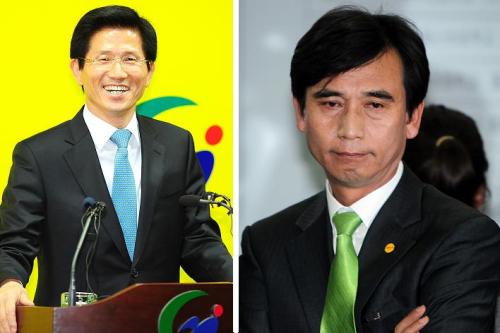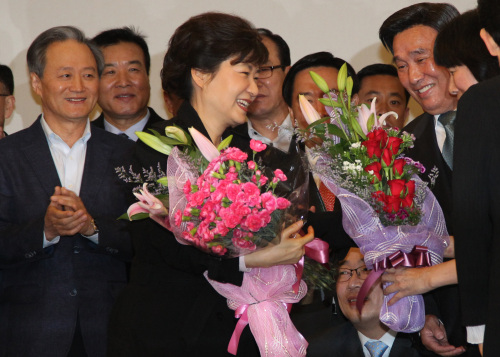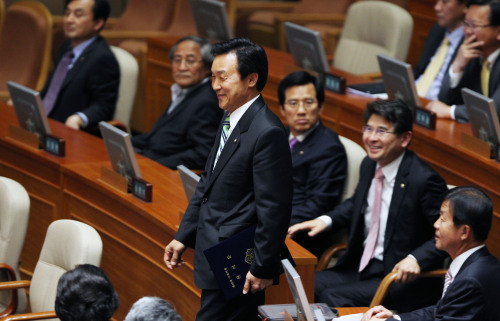Opposition leader’s rise alarming ruling party’s front runner
In the early morning of April 28, a throng of lawmakers were gathering at the entrance of the National Cemetery in Seoul, waiting for their party leader to arrive.
When Sohn Hak-kyu, chairman of the main opposition Democratic Party, showed up around 8:30 a.m., they extended their hands for him to shake and followed him to the tomb of late President Kim Dae-jung.
Paying homage to the deceased liberal leader was a natural part of the day’s schedule for Sohn, who had won an uphill battle against a ruling party contender in a parliamentary by-election on the outskirts of Seoul the previous day.
Sohn later received a hero’s welcome at a meeting attended by all party lawmakers, some of whom praised him as a “new hope” for the nation.
“This election win is the victory of the people who were disappointed at the Lee Myung-bak administration and yearned for change,” Sohn told the applauding DP legislators. “I will devote myself to preparing for a new society and the change of government.”
While Sohn and his party were in a buoyant mood, members of the ruling Grand National Party were engulfed by a sense of crisis that the by-election defeat might be a precursor to next year’s parliamentary and presidential polls.
Of the three parliamentary seats and one gubernatorial post up for grabs in the April 27 by-elections, the ruling party gained just one parliamentary seat in Gimhae, South Gyeongsang Province. What shocked the party most was that its former head Kang Jae-sup lost to the liberal opposition leader in Bundang, a middle-income constituency whose voters had elected only conservative GNP candidates to parliament since the 1990s.
Many GNP lawmakers criticized party leaders close to President Lee, calling for reforms in the party and a shift of policy focus to people’s livelihoods.
“Creative destruction (of the party) is the only answer,” said Rep. Chun Yu-ok who served as party spokeswoman.
Rep. Kim Hyong-o, former National Assembly speaker, said flatly: “The lame-duck period (of President Lee) has begun today.”
Amid the alarm bells, most ruling party members were looking to Rep. Park Geun-hye, former party chairwoman, to play the role of its savior.
“The time is closer for Park to come to the forefront,” said Rep. An Kyung-ryul, describing her “a valuable asset of the party.”
On the day after the by-elections, GNP members’ eyes were riveted on Park, who had distanced herself from the election campaigns, saying she expected the party leadership to handle them well.
In a brief meeting with reporters shortly before embarking on a three-nation European tour as presidential envoy, Park said the whole party bore responsibility for the election defeat, adding that she also felt deeply responsible.
“I will make further efforts to help our party regain public trust,” Park told the meeting at an Incheon airport waiting room packed with her supporters, including more than 30 lawmakers.
The scenes unfolding in the aftermath of the latest round of by-elections signified political gravities were being drawn to Sohn and Park as two potential rivals for the nation’s next presidency.
Cross-bearing leader
Political observers note that the outcome of the by-elections has consolidated Sohn’s position as the standard bearer of the opposition, placing him ahead of his rivals for the DP presidential nomination.
His victory in Bundang, on the back of massive support from workers in their 30s and 40s, showed that Sohn, 63, could be most competitive in drawing support from the key voting group ― middle-income voters in the Seoul metropolitan area.
What boosted his stature further was that he had risked ruining his political future by contesting one of the ruling party’s surest strongholds. Sohn made the decision over objections from close aides when the party failed to find another competitive figure to field against former GNP leader Kang.
A DP lawmaker who belongs to a faction other than Sohn’s conceded that his position would be “highly strengthened” as he succeeded in casting himself as “a leader bearing his cross.” If he goes on in this way, said Rep. Moon Hak-jin, there will be a considerable possibility of Sohn winning the next presidential election set for December 2012.
The by-election setback suffered by Rhyu Si-min, Sohn’s main rival in the opposition fold, was another unexpected political boon for the DP leader. The candidate of the splinter opposition People’s Participatory Party led by Rhyu lost to GNP runner Kim Tae-ho, former South Gyeongsang governor, in Gimhae. The defeat came as a perhaps insurmountable loss for Rhyu, a confidant of late President Roh Moo-hyun, as he had striven to make his party’s contender the unified opposition candidate to run in Roh’s hometown on the southern coast.
In the early morning of April 28, a throng of lawmakers were gathering at the entrance of the National Cemetery in Seoul, waiting for their party leader to arrive.
When Sohn Hak-kyu, chairman of the main opposition Democratic Party, showed up around 8:30 a.m., they extended their hands for him to shake and followed him to the tomb of late President Kim Dae-jung.
Paying homage to the deceased liberal leader was a natural part of the day’s schedule for Sohn, who had won an uphill battle against a ruling party contender in a parliamentary by-election on the outskirts of Seoul the previous day.
Sohn later received a hero’s welcome at a meeting attended by all party lawmakers, some of whom praised him as a “new hope” for the nation.
“This election win is the victory of the people who were disappointed at the Lee Myung-bak administration and yearned for change,” Sohn told the applauding DP legislators. “I will devote myself to preparing for a new society and the change of government.”
While Sohn and his party were in a buoyant mood, members of the ruling Grand National Party were engulfed by a sense of crisis that the by-election defeat might be a precursor to next year’s parliamentary and presidential polls.
Of the three parliamentary seats and one gubernatorial post up for grabs in the April 27 by-elections, the ruling party gained just one parliamentary seat in Gimhae, South Gyeongsang Province. What shocked the party most was that its former head Kang Jae-sup lost to the liberal opposition leader in Bundang, a middle-income constituency whose voters had elected only conservative GNP candidates to parliament since the 1990s.
Many GNP lawmakers criticized party leaders close to President Lee, calling for reforms in the party and a shift of policy focus to people’s livelihoods.
“Creative destruction (of the party) is the only answer,” said Rep. Chun Yu-ok who served as party spokeswoman.
Rep. Kim Hyong-o, former National Assembly speaker, said flatly: “The lame-duck period (of President Lee) has begun today.”
Amid the alarm bells, most ruling party members were looking to Rep. Park Geun-hye, former party chairwoman, to play the role of its savior.
“The time is closer for Park to come to the forefront,” said Rep. An Kyung-ryul, describing her “a valuable asset of the party.”
On the day after the by-elections, GNP members’ eyes were riveted on Park, who had distanced herself from the election campaigns, saying she expected the party leadership to handle them well.
In a brief meeting with reporters shortly before embarking on a three-nation European tour as presidential envoy, Park said the whole party bore responsibility for the election defeat, adding that she also felt deeply responsible.
“I will make further efforts to help our party regain public trust,” Park told the meeting at an Incheon airport waiting room packed with her supporters, including more than 30 lawmakers.
The scenes unfolding in the aftermath of the latest round of by-elections signified political gravities were being drawn to Sohn and Park as two potential rivals for the nation’s next presidency.
Cross-bearing leader
Political observers note that the outcome of the by-elections has consolidated Sohn’s position as the standard bearer of the opposition, placing him ahead of his rivals for the DP presidential nomination.
His victory in Bundang, on the back of massive support from workers in their 30s and 40s, showed that Sohn, 63, could be most competitive in drawing support from the key voting group ― middle-income voters in the Seoul metropolitan area.
What boosted his stature further was that he had risked ruining his political future by contesting one of the ruling party’s surest strongholds. Sohn made the decision over objections from close aides when the party failed to find another competitive figure to field against former GNP leader Kang.
A DP lawmaker who belongs to a faction other than Sohn’s conceded that his position would be “highly strengthened” as he succeeded in casting himself as “a leader bearing his cross.” If he goes on in this way, said Rep. Moon Hak-jin, there will be a considerable possibility of Sohn winning the next presidential election set for December 2012.
The by-election setback suffered by Rhyu Si-min, Sohn’s main rival in the opposition fold, was another unexpected political boon for the DP leader. The candidate of the splinter opposition People’s Participatory Party led by Rhyu lost to GNP runner Kim Tae-ho, former South Gyeongsang governor, in Gimhae. The defeat came as a perhaps insurmountable loss for Rhyu, a confidant of late President Roh Moo-hyun, as he had striven to make his party’s contender the unified opposition candidate to run in Roh’s hometown on the southern coast.

Following the by-election win, Sohn saw his approval ratings soaring, surpassing Rhyu and narrowing the gap with Park.
His approval ratings, which had remained far below a double-digit level since he took the helm of the DP last August, jumped to 14.9 percent right after the by-elections, compared to 7.1 percent for Rhyu and 34.4 percent for Park. His support rating further rose to 17.6 percent in a poll early this month.

Political analysts say the major tasks facing Sohn on his presidential road are to tighten his grip on his party and to merge, or at least form a durable coalition with the more left-leaning minor opposition parties.
Sohn is poised to push through the tasks by putting up the banner of “reform and unity.”
In a meeting with senior party officials Monday, he said the DP should take the path of self-reform and integration, stressing that public demands for change should now be understood as “targeting ourselves.” He suggested he would overhaul the way the party operates and picks up candidates for elected posts, recruiting competitive figures from outside the party.
In the course of putting together opposition forces with different priorities and interests, Sohn would have to walk a tightrope between centrists and left-wingers, something analysts say would make him politically vulnerable. He was criticized both by centrist members of the DP and the minor opposition groups including the Democratic Labor Party when he remained vague over ratifying the Korea-EU free trade agreement last week. Shortly before a parliamentary vote, Sohn refused to endorse an agreement with the GNP on a bipartisan passage of the trade accord, which had been denounced by radical party members and other smaller opposition groups. DP lawmakers boycotted the voting session.
“The decision suggested Sohn would put priority on maintaining the alliance with left-wing forces before moving to the center after consolidating his position as a unified opposition runner in the presidential race,” said a DP official on condition of anonymity. “But in the process, he may lose the central ground to a ruling party contender in an irreparable way.”
Since January, Sohn has hit the road to get in touch with the grassroots across the country. He had a group of reporters accompanying him wait for more than five hours to wipe away snow from a road through a mountain neighborhood and stayed up past midnight listening to complaints and wishes from senior villagers at a community center.
Some observers say moves to connect with workers, farmers and other less-privileged people seem to be part of his efforts to shake his image as a deserter from the GNP. Sohn left the GNP in 2007 after serving as lawmaker, health minister and provincial governor, in a move critics said was motivated by his frustration at the low possibility of getting its presidential nomination.
Aides to Sohn hope his by-election win will put the lid on the controversial choice but commentators say the issue will certainly be raised by his GNP rival in the presidential race.
Sohn’s rise is apparently alarming Park’s camp, which sees the prospect of a duel between them as a formidable one for the former GNP chairwoman.
“Sohn will surely pose the most serious challenge to Park,” said an official who gives advice to Park’s aides on election strategy. “It may be more desirable for Park that more than two opposition candidates will run in the race, but such a possibility seems very dim.”
‘Princess of principles’
GNP officials also caution against complacency based on a high approval rating, noting the party’s nominee Lee Hoi-chang lost the 1997 and 2002 presidential elections to opposition runners Kim Dae-jung and Roh Moo-hyun despite his apparently safe lead in opinion polls.
The 59-year-old former GNP leader, the eldest daughter of the assassinated President Park Chung-hee who was credited for laying the groundwork for the country’s industrialization, has accumulated her political capital by sticking to principles and building public trust.
Months after Sohn left the GNP, Park lost the party’s presidential nomination to Lee Myung-bak and drew public sympathy by appearing to clearly accept her defeat.
In a meeting with reporters in Athens during her European tour last week, she emphasized again the importance of principles and trust in her political life, apparently differentiating her from Sohn and other potential rivals.
Park said she knows some people call her “princess of principles,” wondering why she has often acted against her own interests.
She noted, however, that she came to realize again through her European trip that social capital such as trust and principles is indispensable if South Korea is to become a truly advanced nation.
Park has refrained from conspicuous moves, apparently measuring the right time to officially kick off her second presidential bid. Political observers say she will avoid getting directly involved in the ongoing internal discord in the GNP and aggravating relations with President Lee, whose grip on power is rapidly weakening in the aftermath of the by-election defeat.
Despite her cautious stance, the power structure in the GNP is already being transformed in her favor.
A neutral lawmaker backed by a pro-Park faction and a group of independent legislators beat a pro-Lee candidate in the election of a party floor leader last Friday.
After his election, Rep. Hwang Woo-yea said he will try to create conditions for Park to take a major role, while pledging to keep the party out from under the influence of President Lee and his aides.
On her return from the European trip Sunday, Park congratulated Hwang on his election and hoped he will do his job well to “meet people’s expectations.”
A pro-Park lawmaker said her faction would support the bid by a group of reformist legislators to take the helm of the party.
“It will not do us good to come to the forefront at this moment. It is enough to reflect our will through communications with party members pushing for changes,” said the lawmaker who requested anonymity.
But Park will find it increasingly difficult to distance herself from the political scene and start raising her voice on major issues in the lead-up to getting her presidential bid on track, probably this autumn, say political commentators. They note Park needs to put forth a concrete vision and policies to dispel worries that she lacks experience in handling state affairs.


Surprise rival
With the scenario of a presidential duel between Park and Sohn accepted by many as the most likely, some people are setting their sights on the steps to be taken by Gyeonggi Province Governor Kim Moon-soo.
Hong Ki-pyo, a political commentator and member of the New Progressive Party, recently drew public attention with his book in which he claims Kim may emerge as the eventual winner of the presidential vote.
According to him, opposition parties are likely to win a landslide victory in next April’s parliamentary elections by fielding unified candidates against the GNP, “bursting the overwhelming sentiment in favor of Park.”
Park’s unsophisticated emphasis on welfare will be overshadowed by more comprehensive and popular policies put forward by her opposition rivals, Hong said. He also argues if the security situation surrounding the Korean Peninsula becomes more unstable in the period of North Korea’s father-son transition of power, more voters will be worried about having a woman as their national leader.
What will further weaken Park’s prospect is that she may not be so competitive as Sohn in the key voting group of middle-class residents in Seoul and Gyeonggi Province surrounding the capital, Hong says.
According to him, such factors will add to increasing voices in the GNP for the need to look for another contender against Sohn and the Gyeonggi governor will have a chance of getting its nomination with the backing of the pro-Lee faction at a party convention in the summer of 2012.
“Gov. Kim has the strength of satisfying public demands for extended welfare and giving them assurance in dealing with a volatile security situation,” Hong said.
If Kim faces Sohn in the presidential election, he said, Kim will beat his predecessor as Gyeonggi governor on the back of voters’ sentiment that the crushing defeat in parliamentary elections is enough to punish the ruling party.
By Kim Kyung-ho (khkim@heraldcorp.com)









![[Weekender] Korean psyche untangled: Musok](http://res.heraldm.com/phpwas/restmb_idxmake.php?idx=644&simg=/content/image/2024/05/02/20240502050841_0.jpg&u=)







![[Eye Interview] 'If you live to 100, you might as well be happy,' says 88-year-old bestselling essayist](http://res.heraldm.com/phpwas/restmb_idxmake.php?idx=652&simg=/content/image/2024/05/03/20240503050674_0.jpg&u=)
